Golden Retrievers are beloved for their friendly nature and beautiful coats, but they’re also prone to weight gain that can impact their health and happiness. If you’re searching for the best dog food for overweight dogs, particularly for your Golden Retriever, you’ve come to the right place. This comprehensive guide will help you understand everything about selecting the right nutrition to support your furry friend’s weight management journey.
Contents
- 1 Understanding Weight Issues in Golden Retrievers
- 2 Key Nutritional Components in the Best Dog Food for Overweight Dogs
- 3 Specific Ingredients to Look for in Weight Management Formulas
- 4 Top Brands and Formulas for Overweight Golden Retrievers
- 5 Transitioning Your Golden Retriever to Weight Management Food
- 6 Portion Control and Feeding Guidelines
- 7 Exercise Integration with Nutrition
- 8 Monitoring Progress and Adjusting the Plan
- 9 Common Mistakes to Avoid
- 10 Long-term Weight Management Success
- 10.1 Maintaining Results
- 10.2 Lifestyle Changes
- 10.3 What makes dog food the best choice for overweight Golden Retrievers?
- 10.4 How long does it take to see results with weight management dog food?
- 10.5 Can I mix regular dog food with weight management formula?
- 10.6 Should overweight Golden Retrievers eat grain-free weight management food?
- 10.7 How do I know if my Golden Retriever needs prescription weight management food?
- 10.8 What treats are safe for overweight Golden Retrievers on weight management diets?
- 10.9 Is wet or dry food better for overweight Golden Retrievers?
- 10.10 How do I transition from puppy food to adult weight management food?
- 11 Final Thoughts
Understanding Weight Issues in Golden Retrievers
Golden Retrievers have a genetic predisposition to weight gain due to their slower metabolism and love for food. When a Golden Retriever becomes overweight, it’s not just about appearance– excess weight can lead to serious health complications, including joint problems, diabetes, heart disease, and reduced lifespan.
The best dog food for overweight dogs should address these breed-specific concerns while providing complete nutrition. Unlike generic weight management formulas, Golden Retriever-specific approaches consider their unique dietary needs, activity levels, and metabolic characteristics.
Signs Your Golden Retriever Needs Weight Management
Recognizing when your Golden Retriever needs the best dog food for overweight dogs is crucial for their health. Key indicators include:
- Difficulty feeling their ribs when applying gentle pressure
- Loss of visible waist when viewed from above
- Excessive panting during normal activities
- Reluctance to exercise or play
- Labored breathing while resting
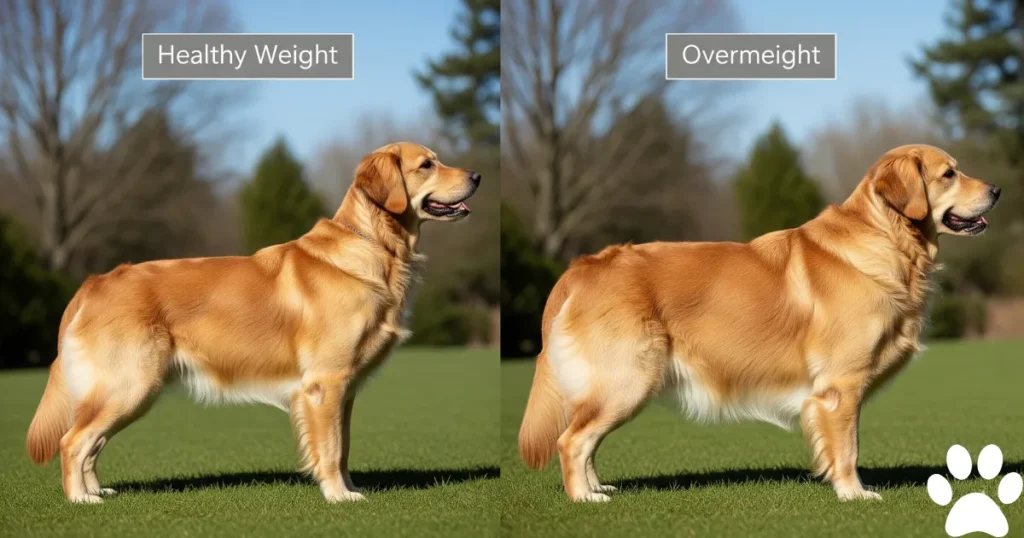
Key Nutritional Components in the Best Dog Food for Overweight Dogs
High-Quality Protein Content
The best dog food for overweight dogs should contain 22-28% protein from premium sources like deboned chicken, turkey, or fish. Protein helps maintain lean muscle mass while your Golden Retriever loses weight, ensuring they burn fat rather than muscle tissue.
Quality protein sources also provide essential amino acids that support your Golden Retriever’s coat health, immune system, and overall vitality during weight management. Look for named meat sources as the first ingredient rather than generic meat meals.
Controlled Fat Levels
While fat is essential for your Golden Retriever’s health, the best dog food for overweight dogs typically contains 8-12% fat content. This reduced fat level helps create the caloric deficit necessary for weight loss while still providing essential fatty acids for skin and coat health.
Omega-3 fatty acids from sources like salmon oil or flaxseed are particularly beneficial for overweight Golden Retrievers, as they support joint health and reduce inflammation associated with excess weight.
Fiber for Satiety and Digestion
The best dog food for overweight dogs incorporates 5-10% fiber from sources like sweet potatoes, peas, and beet pulp. This fiber content helps your Golden Retriever feel full while consuming fewer calories, making weight management more sustainable.
Fiber also supports healthy digestion and can help regulate blood sugar levels, which is particularly important for overweight dogs who may be at risk for diabetes.
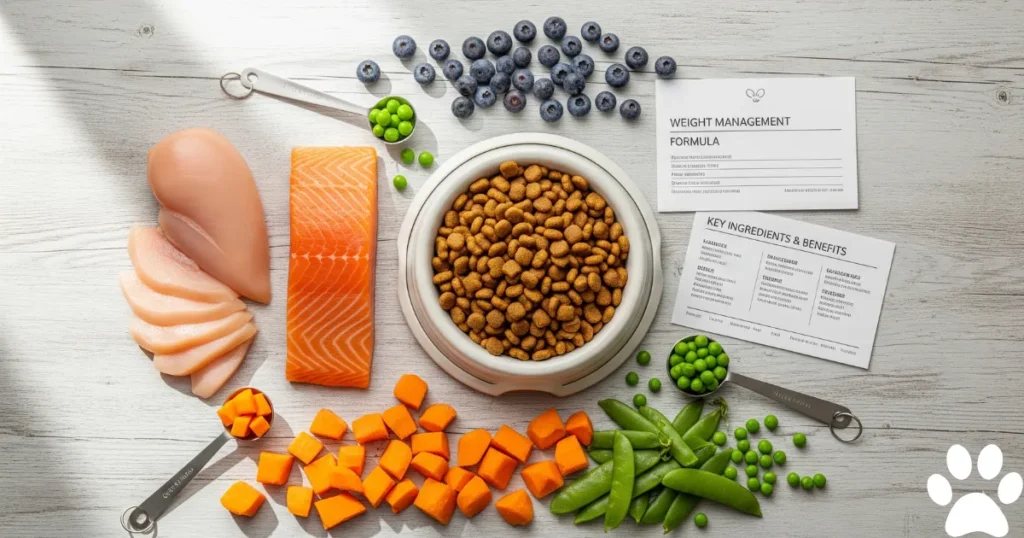
Specific Ingredients to Look for in Weight Management Formulas
L-Carnitine for Fat Metabolism
The best dog food for overweight dogs often includes L-carnitine, an amino acid that helps convert stored fat into energy. This ingredient is particularly beneficial for Golden Retrievers because it supports their natural activity levels while promoting fat burning.
L-carnitine supplementation in weight management formulas can increase the efficiency of your Golden Retriever’s metabolism, making weight loss more achievable and sustainable over time.
Glucosamine and Chondroitin for Joint Support
Since excess weight puts additional stress on your Golden Retriever’s joints, the best dog food for overweight dogs should include joint-supporting ingredients like glucosamine and chondroitin. These compounds help maintain cartilage health and reduce inflammation.
Joint support becomes even more critical during weight loss, as increased exercise is often part of a comprehensive weight management plan for Golden Retrievers.
Natural Antioxidants and Vitamins
The best dog food for overweight dogs incorporates natural antioxidants from fruits and vegetables like blueberries, carrots, and spinach. These ingredients support immune function and overall health during the stress of weight management.
Vitamin E, vitamin C, and beta-carotene are particularly important for overweight Golden Retrievers, as they help combat oxidative stress associated with excess weight and support recovery from increased exercise.
Top Brands and Formulas for Overweight Golden Retrievers
Premium Weight Management Options
Several brands offer formulations specifically designed as the best dog food for overweight dogs. These premium options typically feature higher protein content, controlled calories, and added functional ingredients.
When selecting from these premium brands, look for formulas that specify they’re designed for large breed dogs, as Golden Retrievers have different nutritional needs than smaller breeds during weight management.
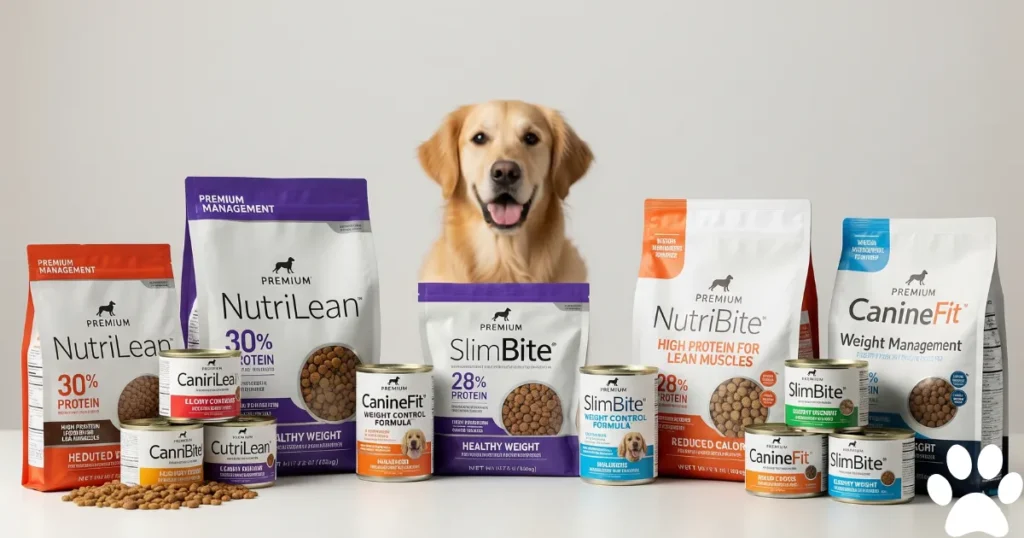
Prescription Diet Considerations
Some Golden Retrievers may benefit from prescription weight management formulas recommended by veterinarians. These therapeutic diets are formulated as the best dog food for overweight dogs with severe weight issues or underlying health conditions.
Prescription diets often have stricter calorie controls and may include additional therapeutic ingredients that support weight loss while addressing related health concerns.
Budget-Friendly Effective Options
You don’t always need the most expensive option to find the best dog food for overweight dogs for your Golden Retriever. Several mid-range brands offer effective weight management formulas with quality ingredients.
When choosing budget-friendly options, focus on the ingredient list and guaranteed analysis rather than marketing claims to ensure you’re still getting effective nutrition for your Golden Retriever’s weight management needs.
Transitioning Your Golden Retriever to Weight Management Food
Gradual Food Transition Process
When switching to the best dog food for overweight dogs, implement a gradual transition over 7-10 days to avoid digestive upset. Start by mixing 25% new food with 75% current food, gradually increasing the new food percentage.
This slow transition is particularly important for Golden Retrievers, as they can have sensitive stomachs and sudden dietary changes may cause gastrointestinal issues that interfere with weight management goals.
Monitoring During Transition
During the transition to the best dog food for overweight dogs, monitor your Golden Retriever for any changes in appetite, energy levels, or digestive health. Keep a daily log of their response to help identify the optimal feeding schedule.
Pay attention to their coat condition, energy levels, and overall demeanor as these can indicate how well they’re adapting to their new weight management nutrition plan.
Portion Control and Feeding Guidelines
Calculating Proper Portions
Even the best dog food for overweight dogs won’t be effective without proper portion control. Calculate your Golden Retriever’s ideal daily caloric intake based on their target weight, not their current weight.
Most weight management formulas provide feeding guidelines, but these are starting points that may need adjustment based on your Golden Retriever’s individual metabolism, activity level, and rate of weight loss.
Meal Frequency and Timing
Divide your Golden Retriever’s daily portion of the best dog food for overweight dogs into 2-3 smaller meals rather than one large meal. This approach helps maintain stable blood sugar levels and reduces hunger between meals.
Consistent meal timing also supports your Golden Retriever’s metabolism and can make the weight management process more predictable and sustainable.
Measuring and Tracking
Use a digital scale or measuring cup to ensure accurate portions of the best dog food for overweight dogs. Even small variations in portion sizes can significantly impact weight loss progress over time.
Keep a feeding log that tracks portion sizes, meal times, and your Golden Retriever’s response to help optimize their weight management plan.
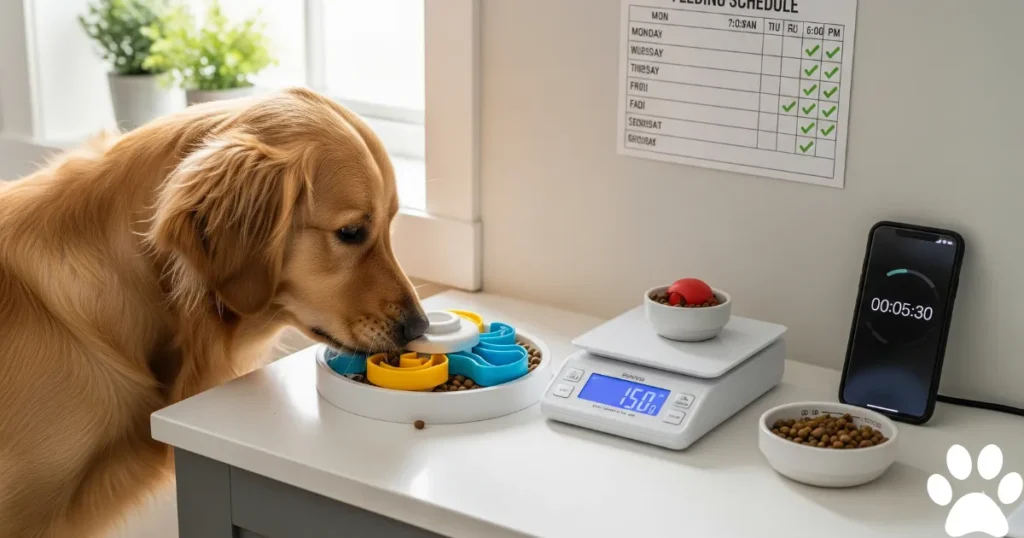
Exercise Integration with Nutrition
Combining Diet and Activity
The best dog food for overweight dogs works most effectively when combined with appropriate exercise. Golden Retrievers need both cardiovascular exercise and strength-building activities to maximize weight loss benefits.
Start with low-impact activities like walking and swimming, gradually increasing intensity as your Golden Retriever loses weight and builds stamina. This approach prevents injury while supporting the nutritional weight management plan.
Activity-Based Feeding Adjustments
Your Golden Retriever’s exercise level may require adjustments to their best dog food for overweight dogs portions. More active days require slightly larger portions to support energy needs without compromising weight loss.
Work with your veterinarian to develop feeding guidelines that account for varying activity levels while maintaining consistent progress toward weight management goals.
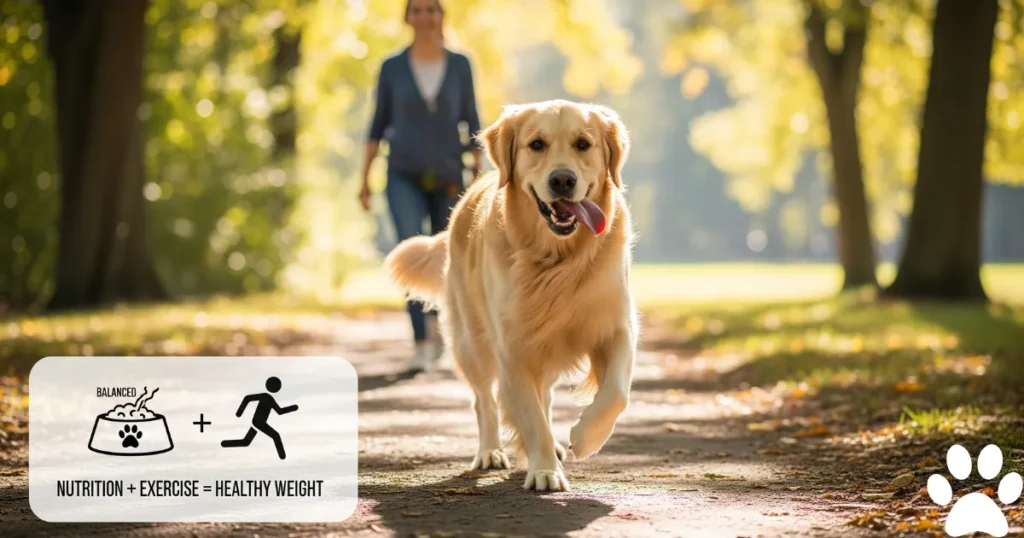
Monitoring Progress and Adjusting the Plan
Regular Weight Tracking
Weigh your Golden Retriever weekly when feeding the best dog food for overweight dogs to track progress. Aim for 1-2% of body weight loss per week, which is considered safe and sustainable for dogs.
Document weight changes along with any adjustments to food portions or exercise routines to identify what works best for your individual Golden Retriever’s weight management needs.
Body Condition Assessment
Beyond weight, assess your Golden Retriever’s body condition monthly using hands-on evaluation. You should gradually be able to feel their ribs more easily and see a more defined waist as the best dog food for overweight dogs supports their weight loss.
Take progress photos from the same angles monthly to visually track changes that might not be apparent from daily observation.
Veterinary Check-ins
Schedule regular veterinary visits during your Golden Retriever’s weight management journey to ensure the best dog food for overweight dogs is supporting their health appropriately. Your vet can assess progress and adjust the plan as needed.
These check-ins can also identify any health issues that might interfere with weight loss or require modifications to the nutritional approach.
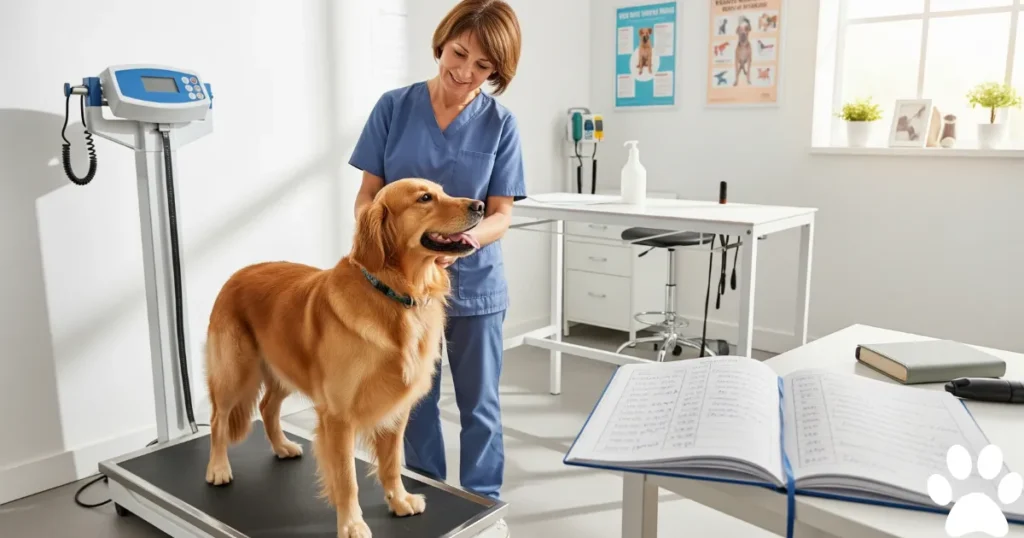
Common Mistakes to Avoid
Overfeeding Healthy Treats
Even when using the best dog food for overweight dogs, excessive treats can derail weight management efforts. Choose low-calorie training treats and account for treat calories in the daily total.
Consider using small pieces of your Golden Retriever’s regular weight management kibble as training rewards to avoid adding extra calories while maintaining the effectiveness of their specialized nutrition.
Inconsistent Feeding Schedules
Irregular feeding times can interfere with the effectiveness of the best dog food for overweight dogs by disrupting metabolism and hunger patterns. Stick to consistent meal times to support your Golden Retriever’s weight management success.
Consistency in both timing and portions helps your Golden Retriever’s body adapt to the new nutritional routine and can improve the overall effectiveness of their weight management plan.
Ignoring Individual Needs
What works as the best dog food for overweight dogs for one Golden Retriever might not be optimal for another. Factors like age, activity level, and underlying health conditions can influence nutritional needs.
Be prepared to adjust your approach based on your Golden Retriever’s individual response rather than rigidly following generic guidelines that might not suit their specific circumstances.
Long-term Weight Management Success
Maintaining Results
Once your Golden Retriever reaches their target weight, transitioning from the best dog food for overweight dogs to a maintenance formula requires careful planning. The goal is to maintain weight loss without regaining excess pounds.
Consider gradually transitioning to a regular adult formula while monitoring weight closely, or continue with a weight management formula at adjusted portions if your Golden Retriever tends to regain weight easily.
Lifestyle Changes
Sustainable weight management extends beyond choosing the best dog food for overweight dogs. Establishing healthy feeding routines, regular exercise schedules, and ongoing monitoring creates lasting success.
These lifestyle changes benefit not just weight management but overall health and can extend your Golden Retriever’s lifespan while improving their quality of life.
What makes dog food the best choice for overweight Golden Retrievers?
The best dog food for overweight dogs designed for Golden Retrievers contains 22-28% protein, 8-12% fat, and 5-10% fiber. It includes L-carnitine for fat metabolism, joint support ingredients like glucosamine, and is formulated for large breed nutritional needs while maintaining lower calorie density.
How long does it take to see results with weight management dog food?
Most Golden Retrievers show noticeable results within 4-6 weeks when consistently fed the best dog food for overweight dogs combined with appropriate exercise. Safe weight loss is 1-2% of body weight per week, so that a 20-pound weight loss might take 4-6 months.
Can I mix regular dog food with weight management formula?
Mixing regular food with the best dog food for overweight dogs can dilute the specialized nutrition and calorie control, potentially slowing weight loss progress. It’s better to transition to a weight management formula for optimal results, then gradually reintroduce regular food once the target weight is achieved.
Should overweight Golden Retrievers eat grain-free weight management food?
Grain-free isn’t automatically better than the best dog food for overweight dogs. Quality grains like brown rice and oats provide beneficial fiber and nutrients. Focus on overall ingredient quality and nutritional balance rather than grain-free marketing when selecting weight management formulas.
How do I know if my Golden Retriever needs prescription weight management food?
Prescription formulas may be necessary if your Golden Retriever is severely overweight (30+ pounds over ideal weight), has diabetes or heart conditions, or hasn’t responded to over-the-counter weight management foods. Consult your veterinarian to determine if a prescription diet is the best dog food for overweight dogs in your situation.
What treats are safe for overweight Golden Retrievers on weight management diets?
Safe treats for dogs eating the best dog food for overweight dogs include small pieces of carrots, green beans, or their regular kibble. Limit treats to 10% of daily calories and choose low-calorie options like freeze-dried single-ingredient treats or specially formulated weight management treats.
Is wet or dry food better for overweight Golden Retrievers?
Both wet and dry versions of the best dog food for overweight dogs can be effective. Wet food often contains fewer calories per volume and higher moisture content, which can help with satiety. Dry food may be more cost-effective and convenient. The key is choosing a formula specifically designed for weight management.
How do I transition from puppy food to adult weight management food?
When transitioning a young, overweight Golden Retriever from puppy food to the best dog food for overweight dogs, do so gradually over 10-14 days. Ensure the adult weight management formula meets large breed puppy nutritional needs if your dog is under 18 months old.
Final Thoughts
Finding the best dog food for overweight dogs for your Golden Retriever requires understanding their unique nutritional needs and weight management challenges. The right formula combines controlled calories with high-quality protein, essential nutrients, and functional ingredients that support healthy weight loss while maintaining muscle mass and overall health.
Success with weight management goes beyond simply choosing the best dog food for overweight dogs. It requires consistent portion control, regular exercise, ongoing monitoring, and patience as your Golden Retriever gradually returns to their ideal weight. Remember that sustainable weight loss takes time, and maintaining results requires long-term lifestyle changes. By implementing the strategies outlined in this guide and working closely with your veterinarian, you can help your Golden Retriever achieve and maintain a healthy weight. The investment in proper nutrition and weight management will pay dividends in your dog’s energy levels, joint health, and overall quality of life for years to come. Your Golden Retriever deserves the best possible nutrition to support their health and happiness throughout their life.
Dr. Nabeel A.
Hi, I’m Dr. Nabeel Akram – a farm management professional by trade and a passionate Golden Retriever enthusiast at heart. With years of experience in animal science and livestock care, I’ve built a career around understanding animals—how they live, thrive, and bring value to our lives. This blog is a personal project born from that same passion, focusing on one of the most loyal and lovable breeds out there: the Golden Retriever. Whether I’m managing farm operations or sharing insights on canine health, behavior, and care, it all ties back to one core belief—animals deserve thoughtful, informed, and compassionate attention. Welcome to a space where professional expertise meets genuine love for dogs.
Facebook |
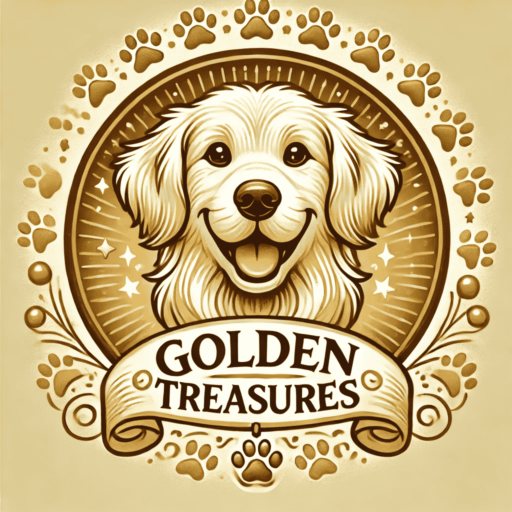
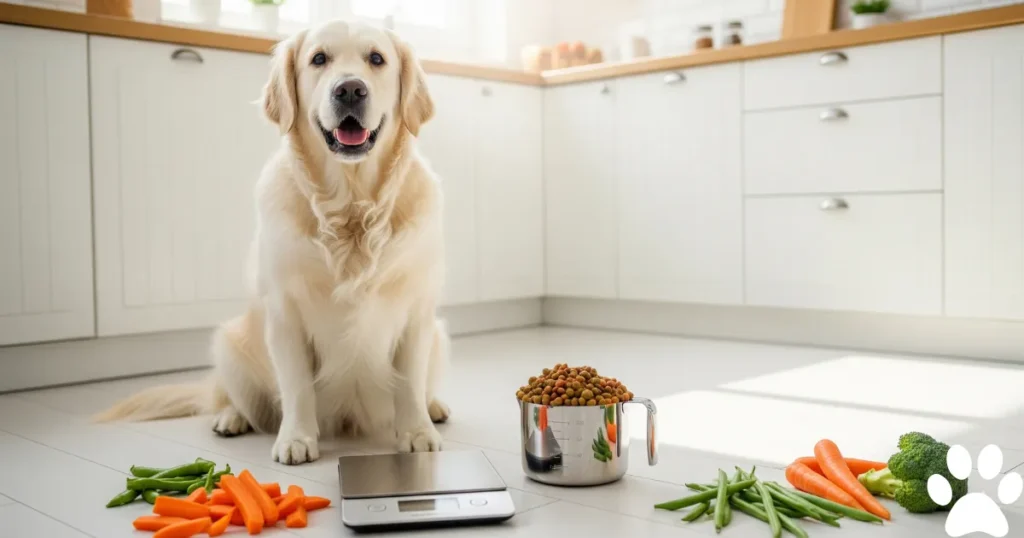
Links will be automatically removed from comments.